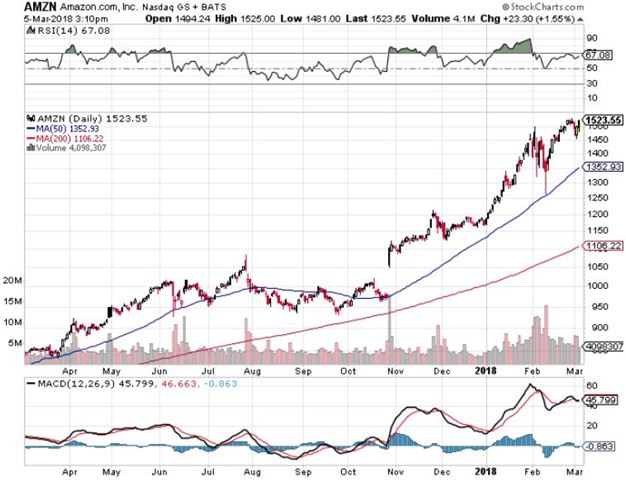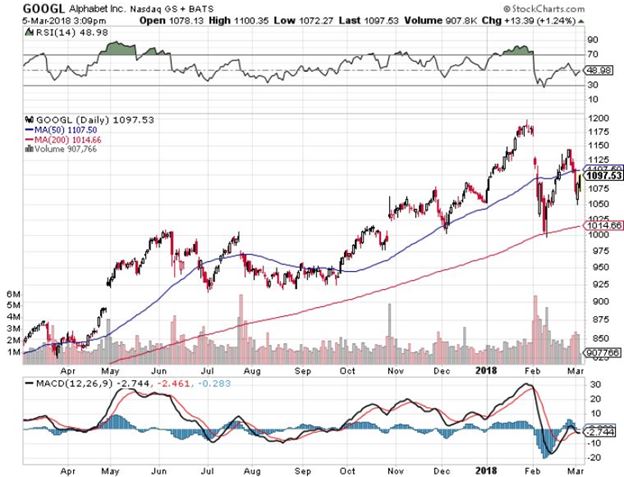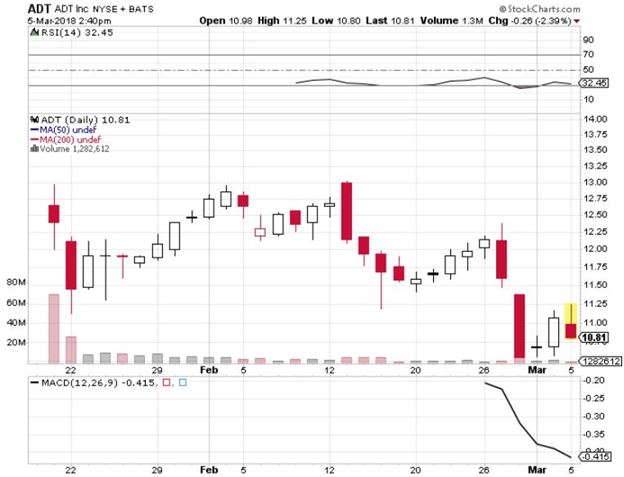Amazon's Big Play in.....Doorbells?
Is the $1 billion Amazon (AMZN) just spent for a doorbell company ludicrous, or genius? This question becomes incredibly pertinent as the battle for the front door heats up.
Transcending cultures since the time of antiquity, a door is a portal to a man's kingdom, his inner space.
Doors were first used inside Egyptian tombs some 5,000 years ago, and the Roman god Janus was the overseer of doors long before Jeff Bezos came along. Doors still continue to encapsulate beginnings, endings, transitions, and time.
A door is first and foremost an entrance. A potential entrance for Amazon to capture market share before the rules of the road are set.
Once entering the main door, hallways are linked with other rooms and other doors that lead to other worlds, which Amazon will pursue once they enter the home.
An open door represents the future and opportunity for a new market. A locked door typifies failure, rejection, and imprisonment. Amazon has created a $700 billion business that stops right outside your door. It's time for them to take the next step.
What would be the monetizing synergies if consumers offer access to that front door and Amazon slowly moves deeper into the house?
The goal is to remove any layers, material or psychological, that stands between Amazon profits and customers.
The door must be beaten down, and convincing consumers its permissible to enter the family sanctuary could fuel another round of tech prosperity and hyper- accelerating tech integration into daily lives.
It is fundamentally impossible to live a practical life in 2018 with analog instruments such as quaint pencil and paper. Consumers are increasingly addicted to technology, and future business applications revolve around harnessing tech acumen which cannot be rooted out retroactively.
The FOMO (Fear of Missing out) phenomenon that has gripped the business world is putting a turbocharger on this trend.
Remember that big tech companies aren't regulated like normal companies and have a built-in license to destroy any industry they desire.
This is immensely bullish for tech stocks. Regulation just cannot keep up. Tech companies believe that they should not be liable or accountable for any unintended consequences. Witness the Russia affair.
By contrast, media companies are harshly regulated by the government, and their content is subject to intense scrutiny. Remember Janet Jackson's infamous "wardrobe malfunction" at the Super Bowl? Unfortunately, media companies do not receive a free pass like the FANG's.
The FANG's free pass has put the family abode directly in the firing line. Alphabet (GOOGL) understands this to full effect; the new $229 Nest Doorbell will be distributed with a free Google Home Mini this spring.
Google Nest was purchased for $3.2 billion in 2014, and was launched by former Apple (AAPL) engineers Tony Fadell and Matt Rogers.
Google Nest has been accused by Ring CEO Jamie Siminoff of stealing their product innovation. Ring is the distinct best of breed in this industry and complements Amazon Key, which automatically opens doors for verified delivery workers.
This was the first adventure into this space by CEO and founder Jeff Bezos and supplements Amazon's Alexa which can cross-integrate with 3rd party devices in over 35,000 unique ways.
In a world where the demarcation of ecosystem lines are clearer and clearer by the day, the FANG's are seducing users into a proprietary closed ecosystem and padlocking anyone that is currently inside.
Facebook (FB) and Google do not sell anything, they just want user time, especially platform user time, to accumulate data to hawk ads to advertisers.
Apple, which does sell something physical, wants customers to buy iPhones, HomePods, and pay for its mish mash of services that integrate under the umbrella of the Apple smart home.
The FANG's have similar yet competing strategies. It is unknown how fast homes will become smart, as we are in the first stage of smartification. But there are a certain set of battleground products such as smart locks, thermostats and security cameras already.
Thermostats are easy to use, and various firms contribute energy rebates for thermostats upgrades.
The $1 billion spent on Ring, or Google's $3.2 billion tab for Nest Labs are FANG's intent to take a major stab at overtaking the place you sleep at night by making it socially acceptable for corporate tech to venture and operate inside houses.
The goal is to create a seamless, automated, enjoyable experience all on one pay tab called the smart home. After a consumer buys multiple products from the same tech company, they investigate further how to connect and integrate all these offerings together.
Thus, the tech climate fiercely focuses on admission into a new ecosystem by any means necessary.
If Amazon can seize the house, it will seize everything that is inside.
Smart homes will not work if the smattering of products and services derive from all different makers. You have to choose a common platform.
Unsurprisingly, home security companies sold off on this news, and this new trend has thrown a spanner into the works for firms such as ADT Inc. (ADT) who have curated a 30% market share. They are the first on the chopping block.
This Boca Raton, Florida company specializes in offering security to residential and small business enterprises. They possess far more weight in the industry compared to rivals Johnson Controls International (JCI) and private firm Vivint.
ADT went public in January 2018 and expected to garner a price of $17-$19. ADT is trading below $11 today. Some of the headwinds analysts have previously mentioned are "increased competition", but nobody thought competition would come in the form of the most powerful company ever to be created in the history of mankind - Amazon. Ouch!
Ironically, in January 2016, Vivint, formerly known as??APX Alarm Security Solutions Inc, agreed to cooperate with Amazon and Nest. Vivint Element team is working on its own smart thermostat and the Vivint Ping Camera for front doors.
This is not a coincidence and the mutual connectivity in tech is everywhere. There are fewer degrees of separation between companies and industries than ever before.
Everyone is overlapping to the point where Amazon refuses to sell Google Nest products on its interface and Google stripping YouTube from all Amazon streaming devices. The more successful these smaller players become, the greater chance of a takeover by a more liquid player.
The FANG's have become juggernauts and any remnant of competition is undercut before it can become a threat and neatly placed under the umbrella of their greater visions.
This strategy has been rampant with botched attempts like Mark Zuckerberg's failed purchase of Snapchat (SNAP) for $3 billion in 2013 and Yahoo's failed buy of Facebook for $1 billion in 2006, just before Zuckerberg launched the fabled news feed.
Even though Vivint is not owned by a FANG, Blackstone Group acquired them for more than $2 billion in 2012.
If you look back in time, Amazon should have never become Amazon. Walmart should have bought it before it gained any traction. Same goes for search - Yahoo should have bought out Google before it became Google. Such is the incredible value of 20/20 hindsight.
Siminoff's Ring is now part of Amazon's death star. Ultimately, if doors are associated with privacy and protection and Amazon can successfully maneuver around these certain sensitive elements, its share will go ballistic.






